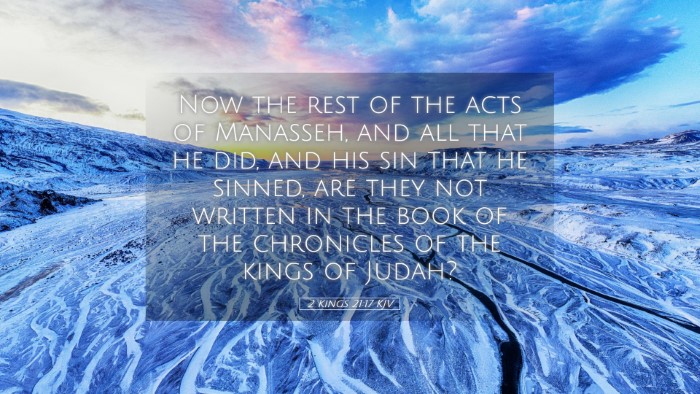Commentary on 2 Kings 21:17
2 Kings 21:17 states: "Now the rest of the acts of Manasseh, and all that he did, and his sin that he sinned, are they not written in the book of the chronicles of the kings of Judah?" This verse serves as a concluding remark about King Manasseh, summarizing his reign and inviting deeper reflection on his life's deeds and the broader implications of sin within Israel.
Historical Context
To fully appreciate the depth of this verse, it is important to examine the historical context surrounding King Manasseh's reign. He reigned for fifty-five years, during which time he became notorious for his apostasy and idolatry, leading Judah into practices that were abhorrent in the sight of God. His reign represents a pivotal moment in the history of Judah, marking an era of significant moral decline.
The Legacy of Manasseh's Reign
According to multiple commentators such as Matthew Henry, Manasseh’s life serves as a cautionary tale. His actions had devastating consequences not just for his own life, but for the people of Judah:
- Idolatry and Apostasy: Manasseh was the architect of a spiritual decline in Judah, promoting the worship of Baal and Asherah, and even resorting to child sacrifice.
- Spiritual Blindness: His depravity and disobedience exemplify a dangerous turning away from Yahweh, showcasing how a leader can lead a nation astray.
Insights from Commentators
Various public domain commentators provide vital insights into the themes illuminated by this verse:
Matthew Henry
Henry emphasizes the importance of documenting one’s deeds, suggesting that every act, whether righteous or sinful, has eternal significance. He reflects that:
- The sins of Manasseh led to God’s judgment upon the nation, underscoring the collective responsibility of leadership.
- Despite his grievous offenses, Henry notes Manasseh's later repentance and restoration, illustrating the possibility of redemption for even the most hardened sinner.
Albert Barnes
Barnes, on the other hand, highlights the chronicling of Manasseh’s acts as a reminder of the value of historical records in understanding God’s dealings with His people:
- The emphasis on the "book of the chronicles" serves to connect Manasseh’s narrative with God’s overarching purpose throughout history.
- His commentary indicates that although Manasseh’s sins were many, they did not erase the entire nation's relationship with God, pointing towards His enduring covenantal faithfulness.
Adam Clarke
Clarke provides a nuanced view, discussing the significance of Manasseh's narrative within the context of Judah's history:
- He refers to Manasseh's extreme wickedness, but also acknowledges the historical context which includes national repentance as a potential opportunity for restoration.
- Clarke suggests that while abhorrent, the sins of Manasseh serve a divine purpose when viewed through the lens of God’s ultimate plan for redemption.
Theological Implications
This verse and Manasseh's life present important theological implications for contemporary readers:
- Leadership and Responsibility: The passage highlights how leaders influence their communities, both positively and negatively. Congregational and societal leaders must exercise their authority with the utmost integrity.
- Grace and Redemption: Manasseh’s eventual repentance reinforces the message of grace. No one is beyond redemption, and even the gravest of sins can be forgiven when one turns back to God.
- The Weight of Sin: This verse serves as a somber reminder of the consequences of sin, not only in the individual life but for the entire community.
Conclusion
In conclusion, 2 Kings 21:17 encapsulates the tumultuous legacy of King Manasseh, reminding us not only of his sinful acts but also of the potential for redemption. It urges both leaders and followers within the faith community to reflect on their actions and the broader impact of those actions on their congregations and society as a whole. The insights gleaned from the commentaries enrich our understanding of this text and challenge us to seek both personal and corporate holiness.


